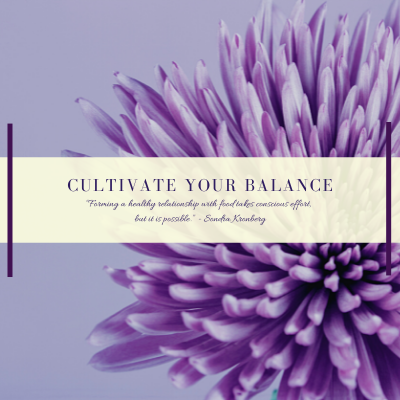It can be a challenge to find a healthy balance that supports your goals without leaving you feeling deprived or restricted. This refers to food habits, exercise, relationships, and pretty much every other aspect of life. Even by reading this far, you have probably considered at least one category, if not more, in which you criticize yourself, have an all-or-nothing mentality, or simply feel inadequate. Before we continue, let us start by saying that this article is not designed to bring attention to all of that. This article, instead, is designed to let you know YOU ARE NOT ALONE in these challenges. Our past and present experiences can sometimes cultivate an unhealthy approach while we’re growing into our goals. Over the next few minutes, let’s look into how you can cultivate a healthy balance based on who you are, where you are in life, your goals, an evaluation of your past experiences, and support partnerships available to you.
This last week of February we want to discuss a healthy relationship with food. Below you will find several strategies that implement our topic from last week – thoughts, beliefs, and actions! All of us eat for different reasons at different times. It may include emotional eating, or eating purely for taste, or celebrating with food. While food fuels our bodies, the experience of eating often reflects other dimensions of well-being. More on that next month. Here are some strategies borrowed from Dr. Sondra Kronberg, who wrote them for the National Eating Disorders Association:
- “Relaxed eating is the ability to be at ease with the social, emotional, and physical components of food and eating.” She also explains relaxed eating as “an extension of self-care and body acceptance.” To understand more and relate it to YOUR life and habits, ask yourself this question the next time you consume a food or drink: Am I eating this because it makes me feel good, because it’s tasty, because it’s healthy, and because I choose to for me in this moment? Relaxed eating is about finding the balance between these motivations… sometimes equal in a particular situation, sometimes led by one or the other in one situation and led by another later in the day. To find a relaxed mindset around your food and drink consumption is “relaxed eating,” a strategy that promotes flexibility and acceptance instead of self-judgment and punishment.
- “Preference over position” is a strategy based on each individual situation. Not every preference we have fits or serves every situation. Certain decisions are okay to be influenced due to your surroundings and current circumstances. “Flexibility, exhibited through the willingness to forego a preference temporarily, is an essential aspect of a healthy relationship with food.”
- “Balance” is a popular term in the wellness world, and it is no different when cultivating a healthy relationship with food. Not only does a healthy balance include a variety of foods, it indicates an ability to eat for both pleasure and hunger. If you have ever created an environment out of restriction (of anything), you have probably experienced the tug-of-war that prevents satisfaction and excitement for that area of your life. It can leave you feeling frustrated, irritated, and even influence how you feel about YOURSELF! That kind of internal tug-of-war will eventually present itself through physical challenges, as well – sleep disturbances, cravings, moodiness, etc.
Dr. Sondra Kronberg’s strategies from the NEDA article apply to ALL of us, and we do recognize they are written with eating disorders in mind. We would be remiss if we didn’t acknowledge eating disorders and the various ways many of us can experience this type of mental illness. Please read this blog for more. It can be quite the challenge to recognize and work through an eating disorder, especially without help. Let this article be a first or next step for you – to evaluate your thoughts, feelings, and behaviors around not just your weight and your food habits, but also your overall perception of health and healthy living.
“Forming a healthy relationship with food takes conscious effort, but it is possible.”
Cultivating a balance means living in the moment, being flexible, showing yourself grace, and learning as you go. And as you know, none of us experience the same situation in the same way, therefore cultivating your balance is also about being true to who you are and what you want, as well as what you need to thrive. Use this next week to consider ways you can cultivate a balance that fits just right for YOU!
Eating Disorder Awareness Week is Feb 21-27, 2022.


